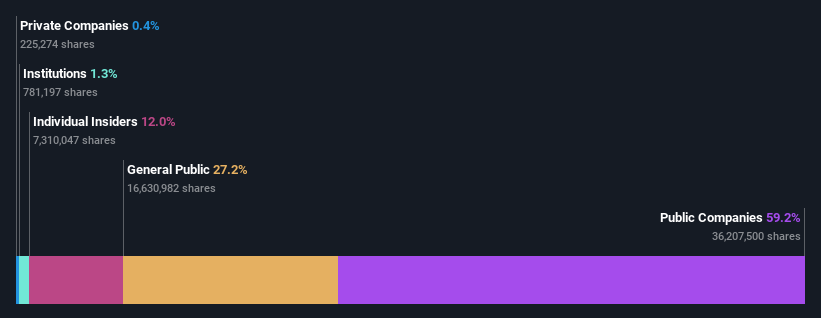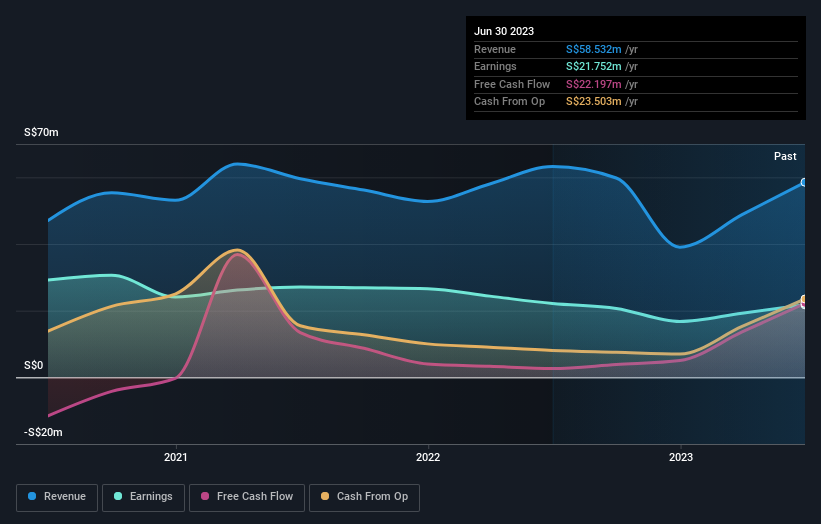Public companies account for 59% of United Overseas Insurance Limited's (SGX:U13) ownership, while individual investors account for 27%
Key Insights
Significant control over United Overseas Insurance by public companies implies that the general public has more power to influence management and governance-related decisions
United Overseas Bank Limited owns 58% of the company
A look at the shareholders of United Overseas Insurance Limited (SGX:U13) can tell us which group is most powerful. We can see that public companies own the lion's share in the company with 59% ownership. Put another way, the group faces the maximum upside potential (or downside risk).
Meanwhile, individual investors make up 27% of the company’s shareholders.
Let's take a closer look to see what the different types of shareholders can tell us about United Overseas Insurance.
See our latest analysis for United Overseas Insurance
What Does The Institutional Ownership Tell Us About United Overseas Insurance?
Institutions typically measure themselves against a benchmark when reporting to their own investors, so they often become more enthusiastic about a stock once it's included in a major index. We would expect most companies to have some institutions on the register, especially if they are growing.
Less than 5% of United Overseas Insurance is held by institutional investors. This suggests that some funds have the company in their sights, but many have not yet bought shares in it. If the company is growing earnings, that may indicate that it is just beginning to catch the attention of these deep-pocketed investors. It is not uncommon to see a big share price rise if multiple institutional investors are trying to buy into a stock at the same time. So check out the historic earnings trajectory, below, but keep in mind it's the future that counts most.
Hedge funds don't have many shares in United Overseas Insurance. Looking at our data, we can see that the largest shareholder is United Overseas Bank Limited with 58% of shares outstanding. This essentially means that they have extensive influence, if not outright control, over the future of the corporation. With 1.9% and 1.9% of the shares outstanding respectively, Cheng Song Thia and Chen Kwong are the second and third largest shareholders.
While it makes sense to study institutional ownership data for a company, it also makes sense to study analyst sentiments to know which way the wind is blowing. We're not picking up on any analyst coverage of the stock at the moment, so the company is unlikely to be widely held.
Insider Ownership Of United Overseas Insurance
The definition of an insider can differ slightly between different countries, but members of the board of directors always count. Management ultimately answers to the board. However, it is not uncommon for managers to be executive board members, especially if they are a founder or the CEO.
I generally consider insider ownership to be a good thing. However, on some occasions it makes it more difficult for other shareholders to hold the board accountable for decisions.
Our most recent data indicates that insiders own a reasonable proportion of United Overseas Insurance Limited. It has a market capitalization of just S$368m, and insiders have S$44m worth of shares in their own names. This may suggest that the founders still own a lot of shares. You can click here to see if they have been buying or selling.
General Public Ownership
The general public-- including retail investors -- own 27% stake in the company, and hence can't easily be ignored. While this size of ownership may not be enough to sway a policy decision in their favour, they can still make a collective impact on company policies.
Public Company Ownership
We can see that public companies hold 59% of the United Overseas Insurance shares on issue. It's hard to say for sure but this suggests they have entwined business interests. This might be a strategic stake, so it's worth watching this space for changes in ownership.
Next Steps:
I find it very interesting to look at who exactly owns a company. But to truly gain insight, we need to consider other information, too. Consider for instance, the ever-present spectre of investment risk. We've identified 3 warning signs with United Overseas Insurance (at least 2 which can't be ignored) , and understanding them should be part of your investment process.
Of course this may not be the best stock to buy. Therefore, you may wish to see our free collection of interesting prospects boasting favorable financials.
NB: Figures in this article are calculated using data from the last twelve months, which refer to the 12-month period ending on the last date of the month the financial statement is dated. This may not be consistent with full year annual report figures.
Have feedback on this article? Concerned about the content? Get in touch with us directly. Alternatively, email editorial-team (at) simplywallst.com.
This article by Simply Wall St is general in nature. We provide commentary based on historical data and analyst forecasts only using an unbiased methodology and our articles are not intended to be financial advice. It does not constitute a recommendation to buy or sell any stock, and does not take account of your objectives, or your financial situation. We aim to bring you long-term focused analysis driven by fundamental data. Note that our analysis may not factor in the latest price-sensitive company announcements or qualitative material. Simply Wall St has no position in any stocks mentioned.


